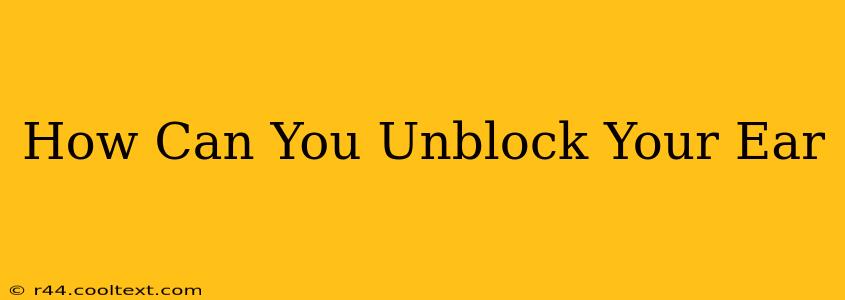An ear blockage can be incredibly frustrating, causing discomfort, muffled hearing, and even pain. Fortunately, many effective methods can help unblock your ear. This comprehensive guide will explore various techniques, from simple home remedies to when you should seek professional medical attention.
Understanding Ear Blockages
Before diving into solutions, it's crucial to understand what causes an ear blockage. Common culprits include:
- Earwax Buildup: Excess earwax is a frequent cause. While earwax naturally protects your ear canal, excessive buildup can impede sound and cause discomfort.
- Fluid Buildup (Serous Otitis Media): This often follows an upper respiratory infection or allergies and involves fluid trapped behind the eardrum.
- Eustachian Tube Dysfunction: The Eustachian tube connects the middle ear to the back of the throat. Dysfunction can prevent proper pressure equalization, leading to blockages.
- Foreign Objects: Small objects, especially in children, can become lodged in the ear canal.
- Changes in Altitude: Rapid changes in altitude, such as during air travel, can cause pressure imbalances and temporary blockages.
Home Remedies for Unblocking Your Ear
Several simple home remedies can often provide relief from mild ear blockages:
1. The Valsalva Maneuver:
This technique involves gently trying to equalize pressure in your ears. Close your mouth, pinch your nose shut, and gently blow air out of your nose as if you were trying to clear it. This should create a popping sensation as the Eustachian tubes open. Important: Avoid forceful blowing, which could cause damage.
2. Yawning:
Yawning naturally opens the Eustachian tubes, often relieving mild pressure. Try yawning repeatedly to see if it helps alleviate the blockage.
3. Swallowing:
Similar to yawning, swallowing can assist in opening the Eustachian tubes. Try swallowing repeatedly, perhaps while drinking water.
4. Warm Compress:
Applying a warm compress to the affected ear may help alleviate discomfort and potentially soften earwax. Never place a warm compress directly in your ear canal.
5. Over-the-Counter Ear Drops:
Some over-the-counter ear drops are designed to soften earwax. Always follow the instructions carefully and consult a doctor if you have any concerns.
When to See a Doctor
While home remedies can be effective for mild blockages, it's essential to consult a doctor if:
- You experience severe pain.
- The blockage persists despite home remedies.
- You notice drainage from your ear.
- You have a fever.
- You experience hearing loss.
- A foreign object is lodged in your ear.
A doctor can properly diagnose the cause of your ear blockage and recommend appropriate treatment, which might include ear irrigation or other medical interventions.
Preventing Ear Blockages
Preventing ear blockages is often easier than treating them. Consider these preventative measures:
- Clean your ears gently. Avoid using cotton swabs or other objects that could push wax further into the ear canal.
- Treat upper respiratory infections promptly.
- Take precautions during air travel. Chew gum or use nasal spray to help equalize pressure.
- Avoid inserting objects into your ear canal.
By understanding the causes and effective treatments for ear blockages, you can quickly find relief and prevent future occurrences. Remember to always consult a medical professional if your symptoms are severe or persistent.

